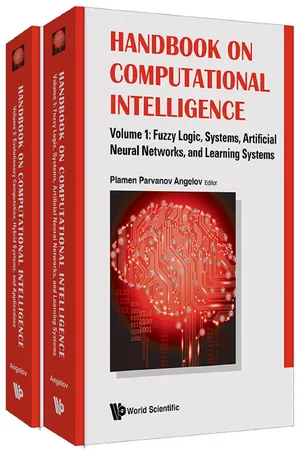
Handbook On Computational Intelligence (In 2 Volumes)
In 2 Volumes
Plamen Parvanov Angelov
- 528 pages
- English
- ePUB (mobile friendly)
- Available on iOS & Android
Handbook On Computational Intelligence (In 2 Volumes)
In 2 Volumes
Plamen Parvanov Angelov
About This Book
With the Internet, the proliferation of Big Data, and autonomous systems, mankind has entered into an era of 'digital obesity'. In this century, computational intelligence, such as thinking machines, have been brought forth to process complex human problems in a wide scope of areas — from social sciences, economics and biology, medicine and social networks, to cyber security.
The Handbook of Computational Intelligence (in two volumes) prompts readers to look at these problems from a non-traditional angle. It takes a step by step approach, supported by case studies, to explore the issues that have arisen in the process. The Handbook covers many classic paradigms, as well as recent achievements and future promising developments to solve some of these very complex problems. Volume one explores the subjects of fuzzy logic and systems, artificial neural networks, and learning systems. Volume two delves into evolutionary computation, hybrid systems, as well as the applications of computational intelligence in decision making, the process industry, robotics, and autonomous systems.
This work is a "one-stop-shop" for beginners, as well as an inspirational source for more advanced researchers. It is a useful resource for lecturers and learners alike.
Contents:
- Introduction by the Editor
- Volume 1:
- Part I: Fuzzy Logic:
- Fundamentals of Fuzzy Set Theory (Fernando Gomide)
- Granular Computing (Andrzej Bargiela and Witold Pedrycz)
- Evolving Fuzzy Systems — Fundamentals, Reliability, Interpretability, Useability, Applications (Edwin Lughofer)
- Modeling Fuzzy Rule-Based Systems (Rashmi Dutta Baruah and Diganta Baruah)
- Fuzzy Classifiers (Hamid Bouchachia)
- Fuzzy Model-Based Control — Predictive and Adaptive Approach (Igor Škrjanc and Saso Blažič)
- Fuzzy Fault Detection and Diagnosis (Bruno Sielly Jales Costa)
- Part II: Artificial Neural Networks and Learning Systems:
- The ANN and Learning Systems in Brains and Machines (Leonid Perlovsky)
- Introduction to Cognitive Systems (Péter Érdi and Mihály Bányai)
- A New View on Economics with Recurrent Neural Networks (Hans-Georg Zimmermann, Ralph Grothmann and Christoph Tietz)
- Evolving Connectionist Systems for Adaptive Learning and Pattern Recognition: From Neuro-Fuzzy-, to Spiking- and Neurogenetic (Nikola Kasabov)
- Reinforcement Learning with Applications in Automation Decision and Feedback Control (Kyriakos G Vamvoudakis, Frank L Lewis and Draguna Vrabie)
- Kernel Models and Support Vector Machines (Denis Kolev, Mikhail Suvorov and Dmitry Kangin)
- Part I: Fuzzy Logic:
- Volume 2:
- Part III: Evolutionary Computation:
- History and Philosophy of Evolutionary Computation (Carlos A Coello Coello, Carlos Segura and Gara Miranda)
- A Survey of Recent Works in Artificial Immune Systems (Guilherme Costa Silva and Dipankar Dasgupta)
- Swarm Intelligence: An Introduction, History and Applications (Fevrier Valdez)
- Memetic Algorithms (Qiangfu Zhao, Yong Liu and Yan Pei)
- Part IV: Hybrid Systems:
- Multi-objective Evolutionary Design of Fuzzy Rule-based Systems (Michela Antonelli, Pietro Ducange and Francesco Marcelloni)
- Bio-Inspired Optimization of Interval Type-2 Fuzzy Controllers (Oscar Castillo)
- Nature-Inspired Optimization of Fuzzy Controllers and Fuzzy Models (Radu-Emil Precup and Radu-Codruţ David)
- Genetic Optimization of Modular Neural Networks for Pattern Recognition with a Granular Approach (Patricia Melin)
- Hybrid Evolutionary-, Constructive- and Evolving Fuzzy Neural Networks (Michael J Watts and Nikola K Kasabov)
- Part V: Applications:
- Applications of CI to Decision Making: Modelling Human Reasoning/Agreement (Simon Miller, Christian Wagner and Jonathan Garibaldi)
- Applications of CI to Process Industry (J M Hernández)
- Applications of Computational Intelligence to Robotics and Autonomous Systems (Adham Atyabi and Samia Nefti-Meziani)
- Selected Automotive Applications of Computational Intelligence (Mahmoud Abou-Nasr, Fazal Syed and Dimitar Filev)
- Part III: Evolutionary Computation:
Readership: Beginners, advanced researchers, lecturers dealing with fuzzy logic, artificial neural networks, learning systems, evolutionary computation, hybrid systems.
Computational Intelligence;Fuzzy Sets;Neural Networks;Evolutionary Algorithms;Evolving Systems Key Features:
- An excellent mixture of pioneers and world leaders with promising "rising stars"
- Comprehensive expert coverage of the main topics
- Easy to read and understand, yet providing in-dept coverage by leaders and experts
Frequently asked questions
Information
Table of contents
- Cover
- Volume 1: Fuzzy Logic, Systems, Artificial Neural Networks, and Learning Systems
- Volume 2: Evolutionary Computation, Hybrid Systems, and Applications
- Index